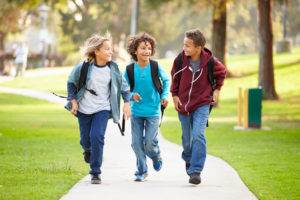 What are social skills?
What are social skills?
These are behaviors and other forms of communication necessary to effectively create and maintain relationships. Social skills might include things like initiating conversations, making friends, having good sportsmanship, and handling bullying effectively.
Social skills are one of the most important skills children and adolescents develop, as they often serve as predictors of future success. Researchers from Pennsylvania State University and Duke University found that youth who scored higher on social skills measurements were four times more likely to graduate from an undergraduate institution. Social skills have also been linked to job success, independence, and emotional well-being. Those with adaptive social skills often demonstrate superior ability to observe, problem solve, and respond in social situations.
Though some may believe undeveloped or lacking social skills indicate that a child may be neurodiverse or on the autism spectrum, this is not always the case. Although most children naturally pick up social cues and behaviors, many children do not. Some kids get caught up in gossip, others may simply be impulsive in the way they respond.
It is not uncommon, however, to find children who have been diagnosed with anxiety, depression, autism, ADHD, and other concerns to experience greater challenges with social interaction and relating to others. This is usually the case because symptoms of these conditions are likely to get in the way of their socialization.
The Impact of Underdeveloped Social Skills
Children do not need to be social butterflies. Indeed, each child will have their own personality traits that help inform the way they interact with others. However, positive relationships in life generally help most individuals thrive. Children and teenagers with well-developed social skills are likely to gain confidence in their abilities to approach situations and complete tasks more successfully.
Social skills are one of the most important skills children and adolescents develop, as they often serve as predictors of future success.
It is important for parents to notice and evaluate any difficulties your child faces. Peer rejection, bullying, conflict, social isolation, depression, anger, anxiety, and poor academic performance may all be signs of poor social skills. Addressing these issues when first noticed will help parents, teachers, and other professionals develop a plan to work with the child to improve their behavior or address social skill challenges. This will typically help the child begin to feel better, too.
When any challenges related to social skills and interaction are not addressed, these issues may persist as a child grows up, and they can become severe enough to have a significant impact on interaction, academic performance, and even the ability to enter the workforce and thrive as an adult.
Can Social Skills Be Taught?
I believe it is absolutely possible for children to learn social skills. Parents, teachers, and mental health professionals can all work, independently and/or collaboratively, to help children develop their social skills.
There are many types of social skills, and it is important to know which areas your child needs help with.
The following are the four types of social skills identified in scholarly literature:
- Survival skills: Listening, ignoring, following directions
- Interpersonal skills: Sharing, joining a conversation, taking turns talking
- Problem-solving skills: Asking for help, deciding what to do/appropriate action to take, recognizing when to apologize
- Conflict resolution skills: Dealing with teasing and bullying, losing/being a good sport, handling peer pressure
The teaching of social skills should focus on desirable behaviors. In other words, parents and educators are encouraged to focus on the behaviors they want to see, not the ones they do not want to see. For example, it’s generally a better idea to teach children phrases they can use to start a conversation, rather than telling them something like, “Don’t ignore people when they talk to you!”
It is also important to allow children the opportunity to practice. Social skills are complex and take time to master. Under the right conditions most children will show improvements, but it’s difficult to improve without the chance to practice.
If a child continues to find social skills challenging after parental and classroom assistance and/or is having difficulties with relational conflict or bullying, is impulsive or shy around others, and has difficulties with peer pressure or making social decisions, it may be time to seek professional help.
Social skills are an important aspect of life, so you may want to enroll your child in a social skills group. Groups are a great place to learn social skills because they typically provide direct instruction, modeling, role-playing, team building activities, and positive reinforcement.
There are many types of social skills groups available, and it is important to find the right social skills group for your child or teen. Make sure the group is designed for your child’s age and that it addresses the specific social skills concerns your child has. It is always a good idea to consult with your child’s current therapist (if one is currently working with your child) and the facilitator of the skills group to go over any questions you may have before your child joins the group.
References:
- Goldstein, A. P., & McGinnis, E. (2001). Skillstreaming the adolescent: New strategies and perspectives for teaching prosocial skills. Champaign, IL. Research Press.
- Laugeson, E. A. (2017). PEERS® for young adults: Social skills training for adults with autism spectrum disorder and other social challenges. NY: Routledge.
- Social skills: Promoting positive behavior, academic success, and school safety. (2017, December 20). NASP Center. Retrieved from http://www.naspcenter.org/factsheets/socialskills_fs.html

The preceding article was solely written by the author named above. Any views and opinions expressed are not necessarily shared by GoodTherapy.org. Questions or concerns about the preceding article can be directed to the author or posted as a comment below.

 How to Improve Communication with Effective Listening Skills
How to Improve Communication with Effective Listening Skills Tips for Improving ADHD-Related Social Skills Deficits
Tips for Improving ADHD-Related Social Skills Deficits Just Say No to Saying 'No': Better Ways to Improve a Child’s Behavior
Just Say No to Saying 'No': Better Ways to Improve a Child’s Behavior

